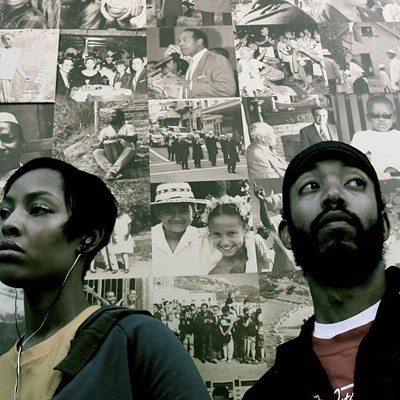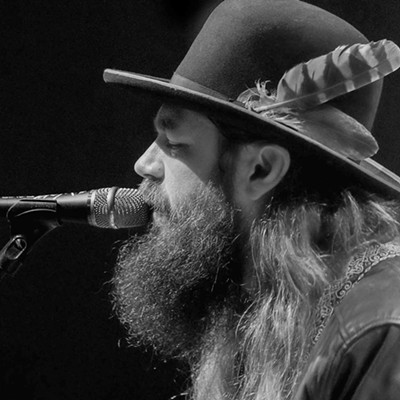No clue why Crowell's face is dirty, but when, a few minutes later, he again answers the phone in his home outside of Nashville, he says he feels a whole lot better.
There must be a metaphor hidden in that innocent act, about emerging from beneath a layer of grime and sweat, about spiritual improvement (we all know what cleanliness is next to), about coming clean, for goodness' sake.
Then again, maybe he just has to wash his face.
It's tough, though, not to read something symbolic in the casual comments about personal hygiene by this veteran country-rock singer and songwriter, who will perform with his band, The Outsiders, Sept. 16 at City Limits.
With his last few albums, Rodney Crowell has entered the realm of the great pop songwriters, those few and rare artists from whom we expect every utterance to be in some way meaningful.
Since 1988's Diamonds and Dirt, evident in Crowell's art have been the pointed satire of Randy Newman, the word-drunk verbiage of Elvis Costello, the laconic poetry of Leonard Cohen, a rocker's social conscience not unlike Steve Earle's and the balance of traditional grit and contemporary fearlessness he shares with his good friend Emmylou Harris.
But the prevailing opinion is that Crowell's last three albums--The Houston Kid in 2001, Fate's Right Hand in 2003 and The Outsider, released last month--have marked an artistic transformation.
All of which rather amuses Crowell. "I don't know why that should be such news. I think (transformation) should be required of all musical artists," he said.
In the case of The Outsider, change means a stripped-down garage-rock sound played by what Crowell describes as the classic Beatles instrumentation--two guitars, bass and drums. Despite the fact that many record retailers will file the CD in the country section, the pop-rockin' vibe is definitely not country. Crowell calls it folk-rock.
This album's musical arrangements were based on the touring band Crowell took to Europe last year, and he wrote many of its tunes during that period, as an American overseas, watching the 2004 presidential elections from a more global point of view.
"I was seeing different news reports, more unbiased news reports. I was certainly getting other opinions on what the country was doing in other parts of the world, and of the election at the time."
That refreshing perspective gave birth to such songs as "Don't Get Me Started," in which a barfly opines on everything from Iraq to Israel; "Ignorance Is the Enemy," an unambiguous treatise that features spoken contributions from Harris and John Prine; and "The Obscenity Prayer," an amazing critique of "gimme-gimme" consumerism sung from the point of view of an SUV-driving, gold-chain-wearing, chauvinistic idiot.
Crowell is well aware that casual listeners might mistake the song's sentiments about Valium, the Playboy Channel, killer weed, supermodels and bleeding hearts as belonging to him rather than his character.
"Yeah. I'm laughing because, well, in 'The Obscenity Prayer,' I sing, 'The Dixie Chicks can kiss my ass / But I still need that backstage pass' ... . When that song was first being heard, a woman came up to me once and said, 'Rodney, I'm gonna buy your album as soon as it comes out, because on that song, you say, 'The Dixie Chicks can kiss my ass'!
"She just didn't get it. I told her I was being sarcastic, that it's called irony. So she said that she didn't care, that she was going to buy my album anyway so she could hear me sing that sentiment, which she clearly related to. And I realized, your intentions can be the best, or most honorable, but in the end, it doesn't matter if somebody wants to hear the song the way they want to hear it."
Crowell's take on the Chicks controversy is different. "I think to vilify the Dixie Chicks for being human beings and having an opinion at that certain time and place was about as un-American as you can get. The last I heard, America was a place built on the freedom of speech.
"I think what bothers me the most about that uproar was that a lot of people weren't treating them as they should their fellow humans. These people who were criticizing the Chicks had no idea how it feels to be up on stage in front of an angry crowd. That's a scary thing, man."
Not all the tunes on The Outsider are politically oriented. The opening track, "Say You Love Me," a punchy rock rave-up, is about missing his wife while playing a concert tour in another part of the world. And "Glasgow Girl" is a lovely depiction of the human and natural beauty observed while tooling through the U.K.
It's also important to note that Crowell's tune "Beautiful Despair" explores the idea that he'll never be as good as his idol, Bob Dylan, while elsewhere on the album, he and Harris deliver a heartbreakingly gorgeous interpretation of Dylan's "Shelter From the Storm."
Crowell said, "Well, I think to anybody who knows me or knows my music, it's pretty clear what a Dylan fan I am. Dylan and Tom Waits have set the songwriting bar as far, as I am concerned."
On the current tour, Crowell is concentrating mostly on recent material with a few oldies, such as his '80s country hits, scattered throughout.
Although he knows some fans will want more of the old stuff, Crowell has to put his foot down--he needs to concentrate on where he's at, not where he has been.
"I feel like I am put here to articulate what is important to me as an artist. That's the job of any artist. I may not agree with your style or sensibility as an artist, but I am certainly not going to say you don't have the right or freedom to express it."
What's worse, he says, is when critics or observers tell him what is or is not acceptable, what is and isn't country, what he should or shouldn't be playing.
"Did you see the documentary about the history of jazz music by Ken Burns? He asked Artie Shaw why he quit playing music, and (Shaw) said it was because people got hung up on what he was doing on his way to becoming a better musician.
"Do I need to elaborate on that at all?"










